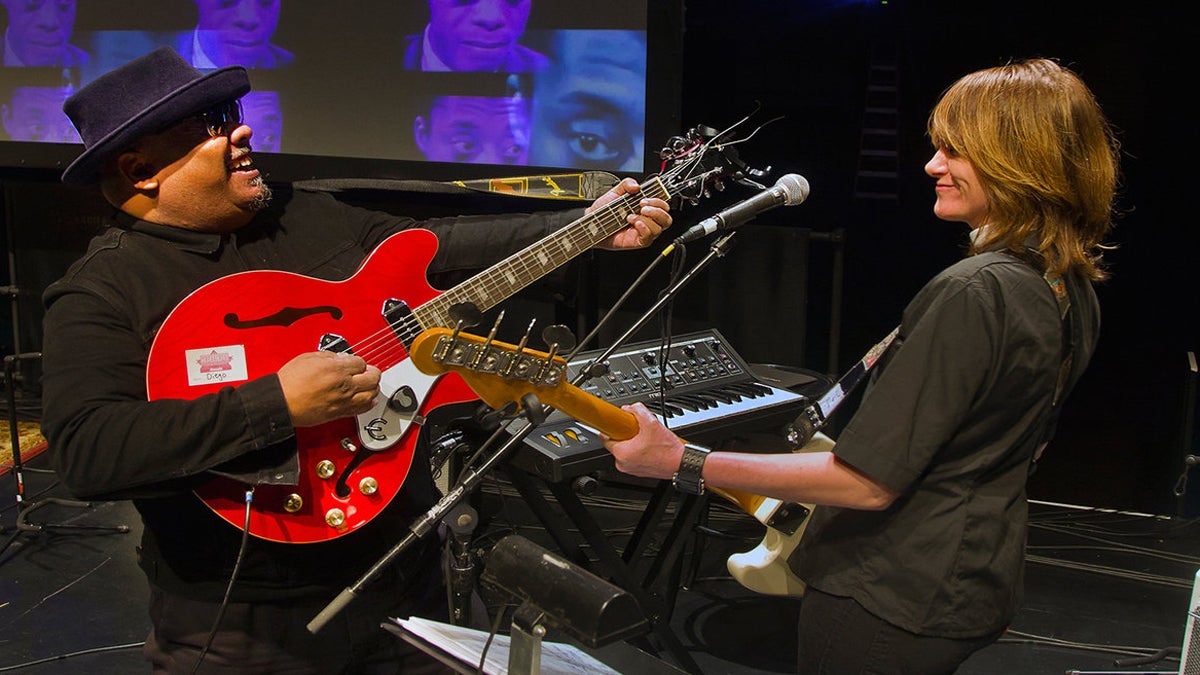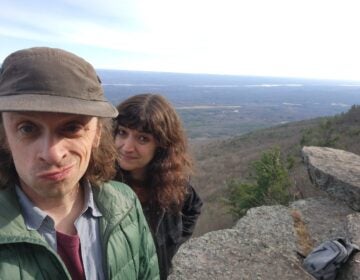Fringe review: ‘Notes of a Native Song’

Stew and his collaborator Heidi Rodewald in 'Notes of a Native Song.' The picture from the show
It’s no wonder that the single-named theater artist Stew and his composer/musician partner Heidi Rodewald sold out their five scheduled performances in the Philly Fringe before the festival even opened — the Wilma Theater, their co-presenter, was able to announce a rare Fringe extension on Sunday afternoon. The creators of the Broadway musical “Passing Strange,” which earned Stew a Tony Award for his book, have an ardent fan base but more than that, a big buzz.
They deserve it. “Notes of a Native Song,” their FringeArts-curated show that opened a night before the festival officially begins, is a performance-art concert with a transcendent five-piece band that includes Stew and Rodewald, and without a plot. But it has the same sensibility of the finely plotted “Passing Strange”: it’s fresh, surprising and moves quickly from idea to idea. It also manages to be great fun even as Stew’s lyrics plumb the darker and quirkier sides of being black in America, and not being black, too.
The inspiration for “Notes of a Native Song,” as you can guess from the show’s word-playing title, is James Baldwin. And Baldwin is there with him and his band, in spirit if not words. (And sometimes on a rear-stage screen, even bopping to the beat at one point in Joan Grossman’s manipulated video head motions.) “Notes of a Native Song” is, as Stew describes it, a reaction that celebrates Baldwin’s work and not a recital or an adaptation of it.
One of the reasons the show works so well is the blend of enticing rock, jazz and blues with Stew’s lyrics, which are heavy on declaration: “Power is so powerful, it can’t afford to pay people to speak truth to it,” say, or “When love meets truth there’s a lot to forgive/ It’s not a safe space but it’s where we live.” These epiphanies come at you from song to song, often soothed by Stew’s sheer charm; he’s an imposing figure, a large black man with a round and highly expressive face. His white-linen suit gives him the presence of a jovial Colonel Sanders, a commanding carnival barker and a gangster, all rolled in one. His guitar, its strings shooting willy-nilly out of its pegs, could be his weapon.
Stew’s banter seems unscripted because he handles an audience with such natural ease; as the 90-minute show moves on, he juices it with more and more expletives that water down what he’s actually saying. Too bad, because if you don’t know a lot about Baldwin, you can begin to understand him and his work through the context of “Notes of a Native Song,” a feat that needs no heavy street-talk. Stew sometimes interrupts himself to explain a point of two about Baldwin’s life and writing: how (like Stew) the disenchanted Baldwin traveled out of the country to live and work, or how Baldwin dissed author and mentor Richard Wright, and much more.
Stew’s bang-up band is called The Negro Problem, after the book of essays compiled and edited by Booker T. Washington early last century. On “Radio Times” the other day, he and Rodewald told WHYY’s Marty Moss-Coane that they’re any band’s least talented players. That was probably modest. Whatever the case, they’re joined by three musicians who make not just music but excitement: the wildly versatile reed and brass player Mike McGinnis, an intense Damian Lemar Hudson on piano and super-drummer Marty Beller. Not only do they solidly interpret the songs, they have a great time doing it.
If you know Baldwin’s work and especially his social commentary, the material in Stew’s lyrics will have meaning beyond the obvious. (Why is Stew singing that way about civil rights or about the vagaries of the state of Florida? Check out Baldwin’s ideas.) Even so, the energizing “Notes of a Native Son” is at least as much about the way Stew thinks as it is about the man he intellectually channels.
—For more information about “Notes of a Native Song,” click here on the title. For more information about the Philly Fringe Festival, visit www.fringearts.com.
WHYY is your source for fact-based, in-depth journalism and information. As a nonprofit organization, we rely on financial support from readers like you. Please give today.




